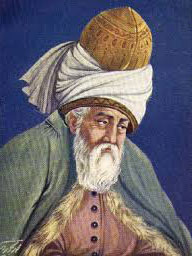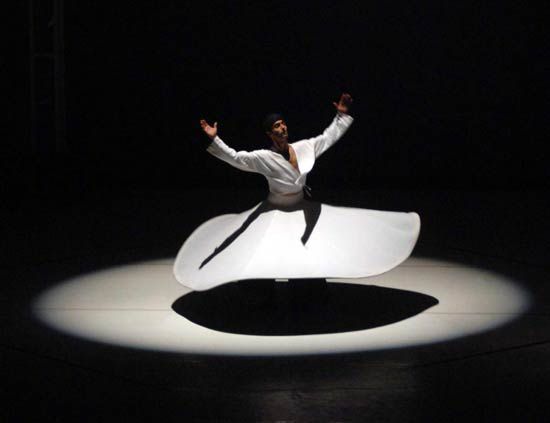Programming / Dance – Poetry – Spirituality
This proposal has been close to my heart for years and at the same time, it worries me and I am not sure of myself.
I asked for many opinions before I started – and all these opinions, all these people who took the time to answer me all reassured me: there is nothing offensive in proposing a Dervish dance show.
My anxiety and hesitations are due to the very essence of this dance – which is not a performance.
It is a real practice of spirituality, inscribed in the Sufi way of the Muslim religion.
I am going – in full awareness of all my ignorance – to explain to you the main codes of this dance which is above all a bias of spirituality.
The dervishes enter the room dressed in a black cloak – which represents our earthly heaviness, our carnal aspect.
The dervish master enters the last one – he symbolizes the One – when the other dervishes represent the multiplicity of searches.
During the truly religious ceremonies – a certain number of times of faith will be performed, alternating music, prayer, the first movements of dances.
The first three turns of the dervishes represent the wandering souls – and it is normally at the end of the 3rd turn that the dervishes drop their black cloaks to reveal their white outfits – which would symbolize that now it will be the light that will guide the “traveler”.
Then the dervishes start to turn and the position of their arms, of their hands, makes sense: the arms open, the right hand turned towards the sky and the left hand towards the earth. The dervish thus symbolizes the Axis of the Universe, which is none other than the Tree of Life. The right hand will collect the grace of Heaven and will spread it on the earth by the left hand turned towards it.
I have voluntarily chosen to present extracts of Sufi dances thought to be shared with everyone – without proselytizing and without disrespect.
The music – the dance – are so many doors to our souls and it is so exciting to see them dancing for them, for us :
This show was produced in France this summer 2020 – it is an artistic derivation of this expression, there won’t be a Sufi dancer but a circus artist who has taken up the codes and depths of the dervish dance: frankly I was impressed.
And as one cannot evoke the Dervishes without giving honor to their master, here are to finish some words of the great Persian poet Rûmî.

As soon as you advance on the path, the path appears.
Raise your words, not your voice. It is the rain that makes the flowers grow, not the thunder.
You think you are the pain, in reality you are the medicine that heals it. You think you are the lock to your heart, in reality you are the key that opens it.
Jalâl ad-Dîn Rûmî is a Persian Muslim mystic who deeply influenced Sufism. Very early on, he received the nickname khodâvendegâr, or mawlânâ khodâvendegâr or mevlânâ, which means “our master”. His name is intimately linked to the order of the “whirling dervishes” or mevlevis, one of the main Sufi brotherhoods of Islam, which he founded in the city of Konya in Turkey.
Featured Image : Ziya Azazi

I love your idea. I love Rumi’s poetry. Indeed Devish whirling is indeed loaded with meaning and enlightenment (along to Hindu or Buddhist meditation). I wrote a poem called Whirling from a woman’s perspective. You should follow through on your idea. 💙🙏🏼
LikeLiked by 2 people
Thank you so much for your encouragement! I was thinking – but this will be a special article – of honoring Rümi’s poetry, which is quite extraordinary.
LikeLiked by 1 person
His poetry is extraordinary. I often find solace in his words.
LikeLiked by 1 person
yes – so do I – He is more than an artist.
LikeLiked by 1 person
I am not offended!
I am empathetic towards the dancers! My head is spinning!
This is very passionate and I enjoyed the music and singing as much as the dance!
Thank you for revealing this expression of spirituality to me. I find it very interesting.
~FF
LikeLiked by 1 person
Merci ! I’m so happy you enjoyed it – I have a lot of respect for the spirituality of others and I always fear my blunders.
LikeLiked by 1 person
You have my respect.
~FF
LikeLiked by 1 person
Merci.
LikeLiked by 1 person
Mevlana Celaleddin-i Rumi and his teacher Şems-i Tebrizi followed a pro-Mongolian policy. And they fought for this at that time. While all the cities were destroyed, only the Konya region was left untouched. Even if there is a philosophical and spiritual beauty in its essence, I believe it is a project, because it rejects resistance and calls for reconciliation in Anatolian soil.
LikeLiked by 3 people
Thank you very much for your comment and these clarifications – which really help to put into perspective what I’ve come forward to tell, a bit adventurous all the same. Çok teşekkür ederim ! Your country is so rich, so beautiful, and with such a grand – and complicated – history that not talking about it would be a real mistake. 🙂
LikeLiked by 1 person
There are so many rituals in Anatolian civilization that they all existed in wealth and this land. Thank you.🙂
LikeLiked by 1 person
Brilliant! Always been interested in Sufism and watching the Dervishes itself is a spiritual experience. Finally I was so happy to read some of the writings/wisdom of Rumi, for years my spiritual guide, but of his teachings I will always be a student. Lovely 😊
All the best,
F
LikeLiked by 1 person
Thank you my dear Francisco – yes, I also think that Sufism and Rumi are a must in thinking, in art, and in the art of loving life – it is one of the most beautiful sources of art, finally, loving life. This is also what I find in your work, which I love very much.
LikeLiked by 1 person
Thank you so very much! I am not a religious man but as Rumi said, I am a lover of God, for me something very important in art. I appreciate your encouragement very much and always look forward to your posts, take good care and all the best,
F
LikeLiked by 1 person
🙂 you’re very welcome !
LikeLiked by 1 person